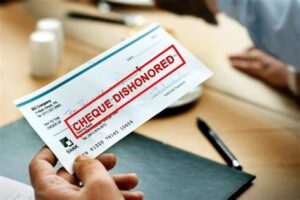Cheque Bounce Complaints
 Under Section 138 of the Negotiable Instruments Act 1881 Cheque Bounce means that a cheque is returned by a bank unpaid for the following reasons:
Under Section 138 of the Negotiable Instruments Act 1881 Cheque Bounce means that a cheque is returned by a bank unpaid for the following reasons:
- Because of insufficient funds in the account
- Because the cheque amount is more than what is permitted to be withdrawn by that cheque
- Because the cheque is stopped by the drawer of the cheque (i.e. the person who has given the cheque) or
- Because the amount in the cheque is more than what is permitted to be withdrawn from that account.
In such cases, the drawer of the cheque (i.e. the person who has given the cheque) is said to have committed an offence which is punishable with imprisonment up to 2 years or with fine up to twice the cheque amount or with both.
Conditions for making a Cheque Bounce Case:
- The cheque was given for legally enforceable debt or liability
- The cheque was present to the bank within a period 6 months from the date mentioned in the cheque
- The cheque was valid when presented to the bank
- The holder of the cheque gives a notice to the drawer of the cheque within a period of 30 days from the date of return of the cheque by the bank.
- The drawer fails to make the payment within period of 15 days from the date of receipt of the notice.
- The holder of the cheque makes complaint before the court within a period of one month from the day when the notice period of 15 days got over.
Complaint may be filed against an individual as well as a company. In case of a company, every person is held to be responsible for the cheque bounce who was in charge of the company at the time of issuance of the cheque.
The complaint can be filed before the court having jurisdiction at any of the following places:
- where the holder of the cheque maintains a bank account, or
- where the drawer of the cheque maintains a bank account.